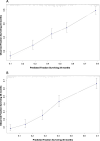Prediction of mortality in metastatic colorectal cancer in a real-life population: a multicenter explorative analysis
- PMID: 33238958
- PMCID: PMC7691098
- DOI: 10.1186/s12885-020-07656-w
Prediction of mortality in metastatic colorectal cancer in a real-life population: a multicenter explorative analysis
Abstract
Background: Metastatic colorectal cancer (mCRC) remains a lethal disease. Survival, however, is increasing due to a growing number of treatment options. Yet due to the number of prognostic factors and their interactions, prediction of mortality is difficult. The aim of this study is to provide a clinical model supporting prognostication of mCRC mortality in daily practice.
Methods: Data from 1104 patients with mCRC in three prospective cancer datasets were used to construct and validate Cox models. Input factors for stepwise backward method variable selection were sex, RAS/BRAF-status, microsatellite status, treatment type (no treatment, systemic treatment with or without resection of metastasis), tumor load, location of primary tumor, metastatic patterns and synchronous or metachronous disease. The final prognostic model for prediction of survival at two and 3 years was validated via bootstrapping to obtain calibration and discrimination C-indices and dynamic time dependent AUC.
Results: Age, sidedness, number of organs with metastases, lung as only site of metastasis, BRAF mutation status and treatment type were selected for the model. Treatment type had the most prominent influence on survival (resection of metastasis HR 0.26, CI 0.21-0.32; any treatment vs no treatment HR 0.31, CI 0.21-0.32), followed by BRAF mutational status (HR 2.58, CI 1.19-1.59). Validation showed high accuracy with C-indices of 72.2 and 71.4%, and dynamic time dependent AUC's of 76.7 ± 1.53% (both at 2 or 3 years), respectively.
Conclusion: The mCRC mortality prediction model is well calibrated and internally valid. It has the potential to support both, clinical prognostication for treatment decisions and patient communication.
Keywords: Metastatic colorectal cancer; Mortality; Nomogram; Prognosis; Real-life.
Conflict of interest statement
The authors declare that they have no competing interests.
Figures
References
-
- Siegel RL. Cancer statitcs. CA Cancer J Clin. 2019;69(1):7–34. - PubMed
-
- Shah MA, Renfro LA, Allegra CJ, André T, De Gramont A, Schmoll HJ, et al. Impact of patient factors on recurrence risk and time dependency of oxaliplatin benefit in patients with colon cancer: analysis from modern-era adjuvant studies in the adjuvant colon cancer end points (ACCENT) database. J Clin Oncol. 2016;34(8):843–853. doi: 10.1200/JCO.2015.63.0558. - DOI - PMC - PubMed
Publication types
MeSH terms
LinkOut - more resources
Full Text Sources
Medical
Research Materials




